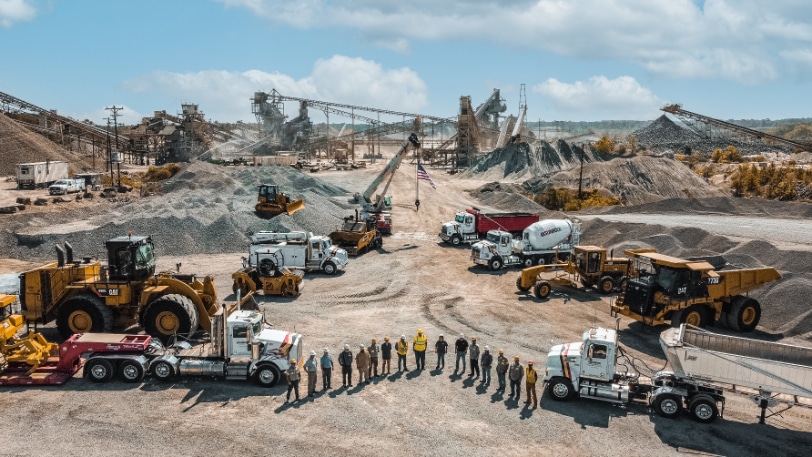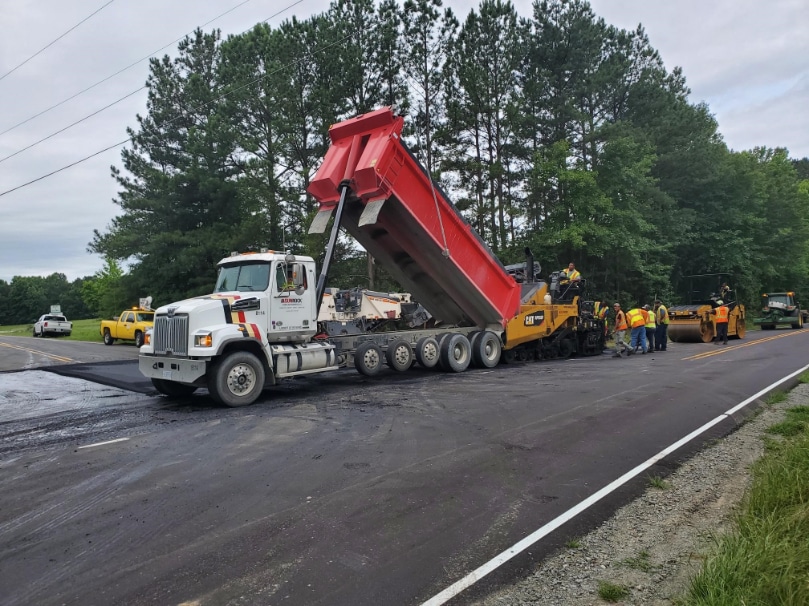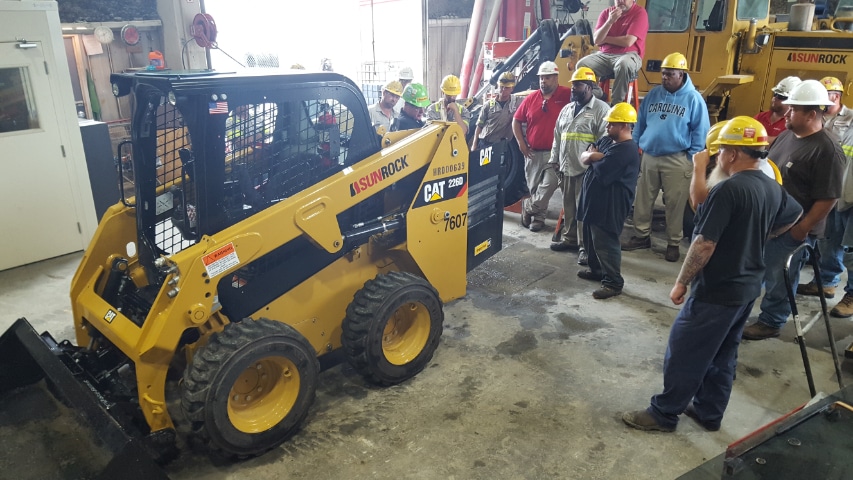Carolina Sunrock Celebrates Sterling Safety Record
BY AsphaltPro Staff

“We live by a simple saying here,” said Gregg Bowler, president of Carolina Sunrock LLC, Raleigh, North Carolina. “‘Do the right thing.’ That’s what we strive for every day, and operating safely is a big part of doing the right thing.”
Carolina Sunrock, a construction materials supplier producing asphalt, aggregates, concrete and recycled materials in North Carolina and Ontario, Canada, was recently recognized by the National Stone, Sand and Gravel Association (NSSGA) as one of its Louis Griesemer Sterling Safety Award winners. The company won the silver award for achieving among the lowest injury incidence rates of NSSGA’s member companies in the medium-sized operations category.
Carolina Sunrock’s Excellence Shines with Latest Commendation
In the past five years, Carolina Sunrock has grown substantially, doubling its total number of employees. Today, the company employs more than 450 people. Alongside the growth of the company, Carolina Sunrock has also expanded its safety program.
“Safety has always been a priority for our owner and chairman Bryan Pfohl, and we have had a great safety program over our 74-year history,” Bowler said. “We’ve always been committed to safety, but since we hired [Safety Manager Jason Jude] seven years ago, he’s taken our safety practices to the next level.”
Employees Engage in Safety
One of the first initiatives Jude established was employee involvement groups (EIGs), a concept he adopted from his days in the coal mining industry. These monthly meetings offer all employees an opportunity to discuss safety observations and outline action items to resolve any concerns.
“We have to have buy-in from the boots-on-the-ground guys,” Jude said, adding that many new safety initiatives are employee-driven. “If they’re involved in the safety process and they see results from their suggestions, they’re more likely to buy into the program. People support what they create.”
For example, Carolina Sunrock recently added chain guards to their return rollers on the conveyor belts at its Butner quarry, where people and vehicles regularly travel beneath the belts. “If the return roller falls, now they won’t fall onto a person, piece of equipment or vehicle,” Jude said. “That’s something an employee recognized as a hazard and brought to our attention.”
These observations from employees enable Carolina Sunrock to take a proactive approach to safety. “If you’re only looking at lagging indicators, like incidents and EMRs, you’re managing based on the past,” Jude said. “If you focus on leading indicators, like near misses and observations, you’re preparing for the future.”
Carolina Sunrock also purchased an equipment simulator by John Deere to simulate operating a loader and an excavator in December 2019. “It gives us the ability to train employees and give them time to practice on the simulator before putting them into a real time production environment,” Jude said.
Carolina Sunrock has also encouraged its employees to observe each other’s safety behaviors. For example, if someone sees another crew member not maintain three points of contact as they enter or exit a piece of equipment, they are empowered to remind their teammate about safety best practices.
“If someone reminds you about safety best practices, it isn’t something to get mad about. It shows that your co-workers care about your wellbeing,” Jude said. This is part of Carolina Sunrock’s focus on behavior-based safety.
With help from Safe Performance Solutions, Blacksburg, Virginia, the company is creating a safety partnership between management and employees that aims to focus peoples’ attention on the daily safety behavior of themselves and others. “It’s a ‘Be your brother’s keeper’ mentality,” Jude said.
“If it feels like management versus the workers, it just doesn’t work,” Bowler said. “We have to recognize that we’re all in this together.”

Carolina Sunrock began using dashboard camera systems from Lytx Inc. in its haul trucks in 2019.
New Outlook, New Initiatives
One example of an initiative that has positively impacted safety performance at Carolina Sunrock is the company’s use of dashboard camera systems from Lytx Inc., San Diego, and fleet telematics from Geotab USA Inc., Las Vegas. The company implemented Lytx in its haul trucks in 2019 and Geotab in its pickup trucks in 2020.
The Lytx cameras, which face both the driver and the road, enable Carolina Sunrock to be proactive with safe driving behavior. If an event is logged, such as the driver talking on a cell phone, speeding more than 10 miles over the speed limit or running a red light, Carolina Sunrock will be notified so they can correct those behaviors before an accident occurs. “We can turn near misses into a positive,” Bowler said.
Geotab offers the same metrics as Lytx, Jude said, only without the video footage. The company’s fleet manager monitors notifications from both programs in real time and the managers receive the reports on a weekly basis. Any events are also factored into the company’s annual bonuses for its salaried employees.
However, both systems require a lot of trust from Carolina Sunrock’s employees, Jude said. “We’ve taken care to show people that we aren’t doing this to monitor them like Big Brother,” he said. “We aren’t even looking at the cameras unless an event occurs and we’re notified of it.”
The company has dialed in both systems so they only receive notifications about events that interest them. “The programs filter out other data, so we aren’t seeing every bump in the road that might set off the camera or telematics,” Jude said.
There have also been instances where the Lytx cameras have exonerated drivers, Bowler said. In one example, the cameras confirmed that the driver was not at fault in an incident where the truck passed through a traffic light as it turned from green to yellow. A car behind the truck called to claim the truck had run a red light, but Carolina Sunrock was able to show the State Highway Patrol video footage to confirm their driver did not run a red light.
In October 2021, the company upgraded all 150 of its haul trucks to the newest Lytx camera system, which also offers real-time feedback to the driver. For example, it gives notifications to increase follow distance if they are too close to a vehicle ahead. In this way, the cameras become not only an observational tool but a training resource.
The Lytx and Geotab technologies will be utilized in its Canadian operations beginning in mid-2022.

Regular training is an important part of Carolina Sunrock’s safety initiatives.
Raise the Bar Higher
Despite its safety success, Carolina Sunrock has plans to continue to raise the bar. “We’re definitely still not where we want to be, and we’re still working towards our goals,” Jude said. Bowler added, “We have to take it one shift at a time and realize the job is never done.”
The next initiative on Carolina Sunrock’s agenda is to go electronic with all its safety processes using software from HCSS, Sugarland, Texas. “We want to automate our paperwork practices so everything is at everyone’s fingertips and can be done by the safety folks while they’re in the field,” Bowler said. “We hope that gives us more time in the field so we can focus on continuous improvement,” Jude added.
Being recognized with a safety award from NSSGA has only made the company want to work harder to improve its safety performance. “The award gives us more motivation to continue down the road we’re on to reduce incidents and accidents to have a safer, more productive workforce,” Jude said.
Of course, keeping its employees safe is the number one goal behind Carolina Sunrock’s efforts to continuously raise the bar on safety. However, the company’s safety record offers additional benefits. “When you have a safe work environment, your insurance rates are lower,” Jude said. “And your risk management meetings are shorter,” Bowler added.
A good safety record can also help during the bidding process. “When we’re trying to bid on particular jobs, a lot of companies look at our EMRs and we can often win a bid based on being a safe company,” Jude said. “We may not be the lowest bid, but we may have a competitive bid paired with our great safety record. And that could be the deciding factor.”
At Carolina Sunrock, it pays to ‘Do the right thing.’
